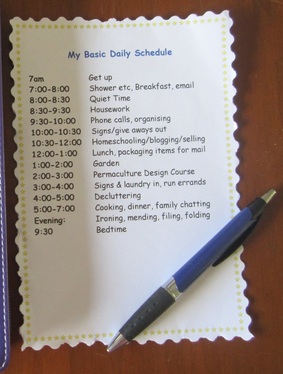
When I was a teenager, I used to have a poster on my bedroom wall of a beautiful lion lying with one front paw over the other, captioned "Every time I put my best foot forward, someone steps on it." It can feel a lot like that when one decides to "get organised" or start following a schedule. Almost guaranteed, just when you think you've worked out the perfect schedule, someone throws up on it. Or "life happens" - a sudden illness or injury by anyone in your family will throw your schedule off, the car breaks down, the cat gets stuck up a tree, the toilet backs up...any one of a myriad possibilities. And it can make you groan and ask yourself "WHY do I even bother??"
So what is the point of a schedule? And is it really a useful, workable tool in a busy life full of unpredictable people and events?
The point of a schedule is not to program your life down to every minute. Its purpose is to give a guiding structure to your days - a chosen focus for a given time period. It's designed to be a tool that helps you get more done, not a task-master that slaps you around and makes you feel inadequate! Here's how I come up with a schedule:
1. I start by thinking about all the major focuses of my life right now - what am I trying to get done? What balls am I juggling? Life is full of seasons - there is constant change as kids get older, needs and desires and interests change, health gets better or worse, certain projects are being worked on etc. You can't create one schedule and expect it to carry you through the rest of your life. You probably need a new one at least every 6 months, or if certain projects are for a shorter period of time, then even more often.
2. Once I've made a list of my current obligations and ambitions, I ask myself if ALL of them are important enough to deserve my focus right now? Could some be dropped, or delayed? And then I ask myself, for the ones remaining, approx how big a block of time do I realistically need to focus on them each day?
3. I start outlining a schedule - what things serve as essential framework? I need to get enough sleep - when am I going to go to bed and get up? Are there fixed daily commitments I need to allow for (eg getting someone off to work or school, or a part time job or course)? What other things are important to me to make time for? Daily prayer and Bible study? Personal exercise? Housework? Plot these in.
4. Now look at all those main focuses you listed - where do those blocks of time best fit in? Can you fit them all in every day, or do some need to alternate? Do you need to adjust how much time you allowed for them? We all have only 24 hours in a day, a good portion of which needs to be set aside for rest, eating, self care and family responsibilities. It makes no sense to then expect we can fit in 14 hours worth of work or commitments in the remaining, say, 8 hours of available time! And this is one of the main benefits of creating a schedule - it helps you be more realistic!
5. I keep fiddling and adjusting, dropping or curtailing things until I have a schedule that seems workable and realistic, with enough breathing space in it not to turn me into a crazy, frustrated madwoman!
6. Most important, I acknowledge to myself that days are seldom going to go according to plan, and that this schedule can and MUST be flexible! So why bother with one in the first place? Because.....
So, let me give you a real life example:
This past weekend I realized I needed a new schedule to help me better manage my current aims and responsibilities. I have several things I'm focused on right now:
So what is the point of a schedule? And is it really a useful, workable tool in a busy life full of unpredictable people and events?
The point of a schedule is not to program your life down to every minute. Its purpose is to give a guiding structure to your days - a chosen focus for a given time period. It's designed to be a tool that helps you get more done, not a task-master that slaps you around and makes you feel inadequate! Here's how I come up with a schedule:
1. I start by thinking about all the major focuses of my life right now - what am I trying to get done? What balls am I juggling? Life is full of seasons - there is constant change as kids get older, needs and desires and interests change, health gets better or worse, certain projects are being worked on etc. You can't create one schedule and expect it to carry you through the rest of your life. You probably need a new one at least every 6 months, or if certain projects are for a shorter period of time, then even more often.
2. Once I've made a list of my current obligations and ambitions, I ask myself if ALL of them are important enough to deserve my focus right now? Could some be dropped, or delayed? And then I ask myself, for the ones remaining, approx how big a block of time do I realistically need to focus on them each day?
3. I start outlining a schedule - what things serve as essential framework? I need to get enough sleep - when am I going to go to bed and get up? Are there fixed daily commitments I need to allow for (eg getting someone off to work or school, or a part time job or course)? What other things are important to me to make time for? Daily prayer and Bible study? Personal exercise? Housework? Plot these in.
4. Now look at all those main focuses you listed - where do those blocks of time best fit in? Can you fit them all in every day, or do some need to alternate? Do you need to adjust how much time you allowed for them? We all have only 24 hours in a day, a good portion of which needs to be set aside for rest, eating, self care and family responsibilities. It makes no sense to then expect we can fit in 14 hours worth of work or commitments in the remaining, say, 8 hours of available time! And this is one of the main benefits of creating a schedule - it helps you be more realistic!
5. I keep fiddling and adjusting, dropping or curtailing things until I have a schedule that seems workable and realistic, with enough breathing space in it not to turn me into a crazy, frustrated madwoman!
6. Most important, I acknowledge to myself that days are seldom going to go according to plan, and that this schedule can and MUST be flexible! So why bother with one in the first place? Because.....
- With a schedule in place, generally more will get done than if one just "flies by the seat of one's pants," even on those days when disaster strikes.
- A schedule gives you a focus - you know what you're needing to work on in a given time. Yes, you definitely lay aside your agenda when a child or husband needs you, but the rest of the time, you know what you are supposed to be focused on, and can train yourself not to get sidetracked by other things - email for example.
- When interruptions have come and gone, you can get back on track more easily. If a big chunk has been taken out of my day, I then chose whether to ignore the things left out and just pick up at the current time on my schedule, or to go back to important things, and adjust the rest of the plan for the day.
- The process of creating a schedule has the very desirable effect of making us take a realistic look at our lives and what we are expecting to fit into them, and discover whether it's possible, or we're setting ourselves up for a sense of failure. Once, many years ago when my children were small, I made a list of everything I felt I needed to get done every day, with approximate, realistic times of how long it took. I discovered that my days included some 32 hours of responsibilities, for every 24 hours period. This did two things for me - it stopped me feeling so guilty that I wasn't "getting it all done," and it caused me to adjust my expectations of myself!
So, let me give you a real life example:
This past weekend I realized I needed a new schedule to help me better manage my current aims and responsibilities. I have several things I'm focused on right now:
- Keeping up on housework
- Making sure I set aside time to spend in Bible study and prayer
- My 1000 Things decluttering goal - until the end of May - including giving things away, and advertising items for sale as well as posting sold books etc.
- Blogging about the decluttering, and also maintaining my gardening blog
- A Permaculture Design Course I'm enrolled in - it's online and from home, but needs a couple of hours a day study, until the end of July.
- Homeschooling my remaining two students - they learn mostly independently now, but I need to be present and available to help with problems, administer tests etc
- Keeping on top of all the administrative tasks of running a household and my husband's business.
- Doing the gardening and homesteading that provides much of our food etc

I finally came up with a workable schedule for the next few months. It's not perfect, and will certainly need tweaking as I go along. Of course, it will only work for those days when I'm mostly at home. But it does help me get more done.
I started using this schedule on Monday, and was doing well, until 9:50am when one of my daughters fell off a chair in the room she is renovating for her sister and impaled her foot on a crowbar. (There's something about Mondays and schedules....). The next several hours were spent in first aid, doctors etc....BUT despite this, my schedule had already helped me get much more done that I otherwise would have by that time of the morning, the majority of the important items on my running to-do list for the day were already crossed off, and when the situation was over, I knew exactly what I needed to do to get the rest taken care of, and where to pick up with my schedule!
Yes, I think a schedule is definitely a useful, workable tool, even in a busy, crazy life full of the unpredictable - so long as you use it to help you think and plan, then hold it loosely day to day.
I started using this schedule on Monday, and was doing well, until 9:50am when one of my daughters fell off a chair in the room she is renovating for her sister and impaled her foot on a crowbar. (There's something about Mondays and schedules....). The next several hours were spent in first aid, doctors etc....BUT despite this, my schedule had already helped me get much more done that I otherwise would have by that time of the morning, the majority of the important items on my running to-do list for the day were already crossed off, and when the situation was over, I knew exactly what I needed to do to get the rest taken care of, and where to pick up with my schedule!
Yes, I think a schedule is definitely a useful, workable tool, even in a busy, crazy life full of the unpredictable - so long as you use it to help you think and plan, then hold it loosely day to day.

Due to a lot of unexpected interruptions last week, I wasn't able to keep up with daily blogging about my 1000 Things, though I was able to declutter most days. So here I'm combining the items assigned to give away or sell over three days of last week.
50 items were added to the give away boxes, including: 3 books, 2 sets of kids writing paper, 1 DVD, 12 CD cases, 2 blank DVD-R discs, 1 set origami papers, 1 set of invitations/envelopes, 2 audio CDs, 2 calendars, 1 knick knack, 7 post-it pads, 1 bookmark, 1 notepad, a bag of gift tags, 1 CD holder, 1 notebook, 1 compendium, 1 homeschooling manual, 1 tray and 8 highlighters.
50 items were added to the give away boxes, including: 3 books, 2 sets of kids writing paper, 1 DVD, 12 CD cases, 2 blank DVD-R discs, 1 set origami papers, 1 set of invitations/envelopes, 2 audio CDs, 2 calendars, 1 knick knack, 7 post-it pads, 1 bookmark, 1 notepad, a bag of gift tags, 1 CD holder, 1 notebook, 1 compendium, 1 homeschooling manual, 1 tray and 8 highlighters.

12 DVDs, 6 Videos and 45 Books joined the for sale items, for a total of 63.
 RSS Feed
RSS Feed
